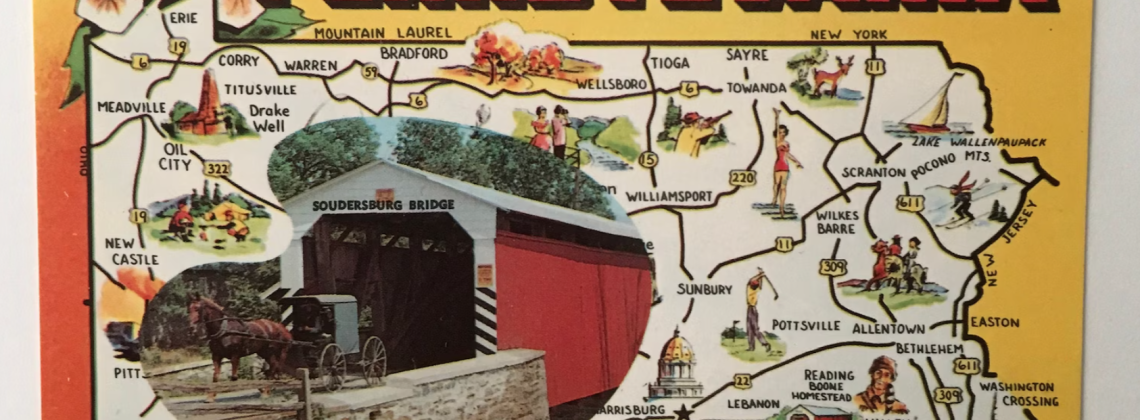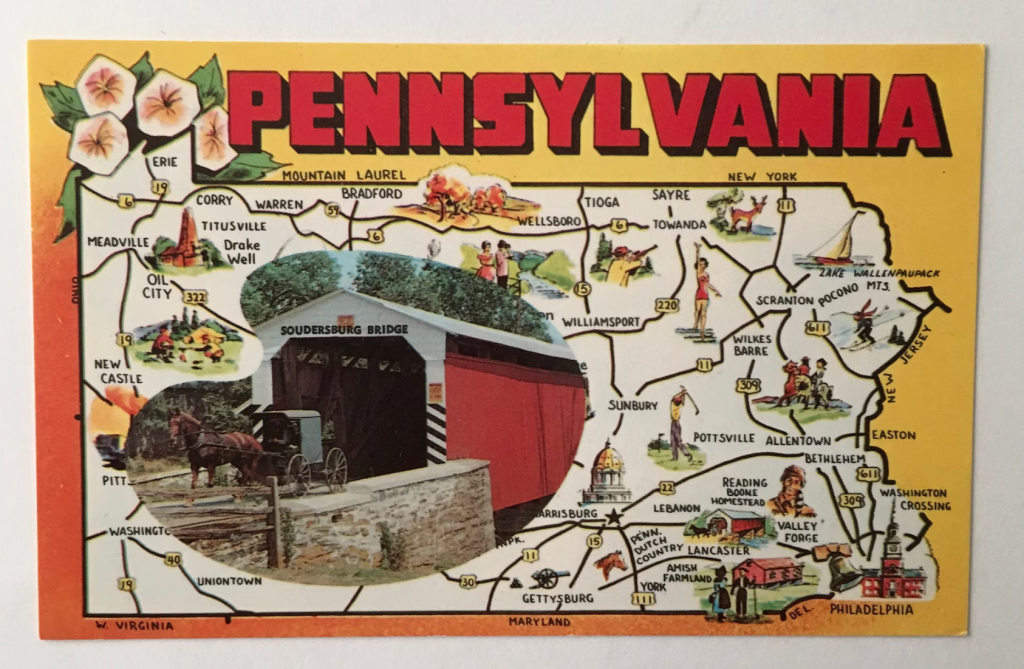

This election season Pennsylvanians have come out swinging—again
For the first time in ten years none of our kids came home for spring break. So we reverted to form and drove east to the folks, a four-day jaunt that looped around about fifty percent of Pennsylvania: from metro Pittsburgh up to I-80, east atop the mountains, down along the Juniata and the Susquehanna into York, then west on hilly Route 30 to Bedford. Four days later, visiting done, we skirted the fringe of southern PA along I-68 and barreled up I-79 to our abode in Beaver Falls, where Luna our cat had nobly secured the homestead.
The closest thing we saw to a sign for Biden was one for Nikki Haley in Bedford—the day Haley finally bowed out. Of the dozens of Trump signs, the most memorable was the one somehow staked to the side of a cliff and positioned directly in the line of sight of drivers making a descent into the Juniata River valley. There’s been a lot of talk about the rising education divide between the two parties. If it didn’t take education, exactly, to get that sign there, it certainly took ingenuity.
And inspiration, though it was something like seeing Steelers signs all over Pittsburgh: Is there any doubt where local allegiances lie? The polls don’t lie; the more rural the place, the more Trumpward the signs. What are we trying to say with these tokens? What are we trying to do? Shore up doubt? Give the finger to the wandering urbanite? Sing out our favorite democratic song?
Pennsylvania—one of four states that declares itself a commonwealth—sings and swings, year after year. Democratic-Republican Thomas Jefferson won PA in 1796 (when the Federalists were the opposition), followed by sixty years of Democratic-Republican (and eventually just Democratic) victories, until Pennsylvania gave Lincoln 56% of its vote in 1860, when the GOP was new. Thus began a run of Republican victors until 1936, interrupted only by Progressive (and ex-Republican) Teddy Roosevelt in 1912. After Hoover came out on top in ’32 (50.84%) the swinging began in earnest: FDR to Dewey to Eisenhower to Kennedy to Johnson to Humphrey to Nixon to Carter to Reagan to Bush to Clinton to Gore to Kerry to Obama to Trump to Biden.
It’s hard to keep singing through so much swinging. The battleground metaphor seems more apt—swinging fists. And it has for a long time, in fact. Peter Silver won the 2008 Bancroft Prize with Our Savage Neighbors: How Indian War Transformed Early America, in which with rare panache he tells the tale of what he calls “this new world of resentful social fragments.” Early Pennsylvanians made their name at home and abroad as a warring people, at first against each other and then as a united front, coalescing, finally, to destroy the Indians once and for all. The embattled native peoples were the “savage neighbors” who in the French and Indian War faced a range of recently unified Protestant communities that, whatever their religious aspirations, lived at an evident distance from that Mount where a certain Sermon was once delivered. Pennsylvanians bathed themselves instead in what Silver calls “anti-Indian sublime,” reflecting the era’s “fascination with the very experience of having intense feelings.” Flags and signs were everywhere, no doubt.
But more than 250 years later we’re still split up. Telling fact: Pennsylvanians never have identified themselves as Pennsylvanians. Long branches of our own family extend from eighteenth-century Pennsylvania; I myself have lived here all but eight of my fifty-seven years. It’s not how we talk about ourselves. We’re from places—Erie and Bradford and Johnstown and Wilkes Barre and West Chester and Philly. You may think that Rochester and Monaca are just across the river from each other—neighbors. But if they are, they’re savage neighbors, often enough, as lore of football rivalries and weekend fights still tells.
I laughed when we drove back into PA from West Virginia and saw our welcome sign with its cheery post-commonwealth slogan: Pennsylvania: Pursue Your Happiness. Not too many miles later we passed the exit for two towns, Amity to the west and Lone Pine to the east. That’s the choice we’ve faced again and again in this aged and costly pursuit of happiness. And now we’ve once more ditched the Mount of Beatitudes for the loneliness of attitude.
As it turns out, we caught sight of the sign as we were listening to Dylan’s Nashville Skyline. Zimmie was, as ever, right on time: “One more night, the stars are in sight / But tonight I’m as lonesome as can be.”
It’s been a tough ten years in this land that I love, as the fragments have once more found each other, singing out their resentments and turning a savage eye toward the Other. I liked the old Pennsylvania better, where each place was a place not quite like any other. The great digital melding is liquifying our finer distinctions, and our pitiful political cries are all we have left to raise, a banner that above all screams LONELY.
Driving along, though, you can’t help but notice that the land too remains—the real Pennsylvania, the woods where it all started, where Penn dreamed of peace and union. No one then could have fathomed wealth apart from the land. It leaves me wondering: Who does the land hope wins this election? If Pennsylvania’s stone and trees and water and earth, suffering unceasing depredation, are crying out a name, whose is it?
I think it’s ours, each of ours, summoned here as stewards to care for what matters, for that upon which we all stand. Will we heed the call? “Mark it down: / the healing has now been authorized,” declares the venerable Lancaster (PA!) band The Innocence Mission. I believe it, I do. But I really really want to see it, too.
Eric Miller is Professor of History and the Humanities at Geneva College, where he directs the honors program. His books include Hope in a Scattering Time: A Life of Christopher Lasch, and Brazilian Evangelicalism in the Twenty-First Century: An Inside and Outside Look (co-edited with Ronald J. Morgan). He is the Editor of Current.
I want to see the “Brotherhood of Man” among my favorites from the IM catalog.